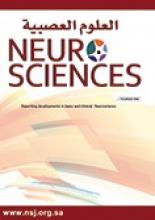Abstract
OBJECTIVE: The aim of this study was to screen a sample Palestinian population for sleep habits and various sleep disorders using a standard questionnaire.
METHODS: The questionnaire was designed to assess sleep habits, the degree of daytime sleepiness using the Epworth Sleepiness Scale (ESS), and specific sleep problems. A random sample of Palestinian people from Gaza City, Palestine was selected during August 2002.
RESULTS: There were 361 respondents to the questionnaire (59 females and 302 males). The mean ESS score was 8.25 for males and 8.2 for females. There was 99 (27.4%) subjects with an ESS >10 (with excessive daytime sleepiness), normal sleepers without any sleep problems reported an ESS score of 7.37. One hundred and seventeen (32.4%) subjects (23 females and 94 males) had insomnia. There were 3 females and 101 males with snoring, but only 5 females and 48 males reported a history of sleep apnea. Symptoms of sleep paralysis were reported in 37 (10.2%) subjects, restless leg syndrome in 41 (11.4%) and cataplexy in 7 (1.9%) subjects.
CONCLUSION: The prevalence of excessive daytime sleepiness in the Palestinian population is higher compared to reported western populations, and it is the same as reported populations with similar habits. Generally, sleep disorders are common all over the world but ignored and unrecognized in our society.
- Copyright: © Neurosciences
Neurosciences is an Open Access journal and articles published are distributed under the terms of the Creative Commons Attribution-NonCommercial License (CC BY-NC). Readers may copy, distribute, and display the work for non-commercial purposes with the proper citation of the original work.






